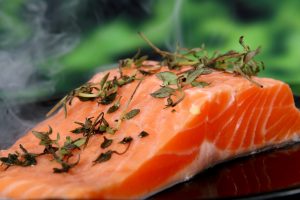Fish. One of the cornerstones of the athlete’s lifestyle.
The basis of an athlete’s diet is an adequate intake of protein and nutrients in the right quantity and quality. One of the best and purest sources of protein is fish.
Fish and their nutritional value (100 g)
|
Fish |
Calories | Proteins | Carbohydrates | Fats | Cholesterol | Sodium |
|
Cod |
80 | 18 g | 0 g | 0,7 g | 35 g | 70 mg |
|
Flatfish |
91 | 18,5 g | 0 g | 1 g | 49 g | 80,5 mg |
|
Giant halibut |
108,5 | 20,6 g | 0 g | 2,1 g | 31,5 g | 42,5 mg |
|
Mackerel |
203 | 18,5 g | 0 g | 13,6 g | 70 g | 100 mg |
|
Southern red snapper fish |
98 | 20,3 g | 0 g | 1,4 g | 35 g | 63 mg |
|
Salmon |
147 | 20,6 g | 0 g | 6,6 g | 56 g | 42,5 mg |
|
Swordfish |
119 | 19,6 g | 0 g | 3,8 g | 38,5 g | 38,8 mg |
|
Trout |
146 | 20,6 g | 0 g | 6,6 g | 56 g | 42,5 mg |
|
Tonhal, kékúszójú |
143 | 23,1 g | 0 g | 4,9g | 38,5 g | 38,5 mg |
|
Tuna, yellowfin |
108 | 23,1 g | 0 g | 17,4 g | 45,5 g | 35 mg |
In addition to their extremely high protein content, they contain virtually no carbohydrates and are extremely low in fat and calories. This makes them an excellent choice even for a strict weight-loss diet, but their purity also makes them a good choice for a basic diet. In any diet, you should aim for a varied nutrient intake, as the body needs it, and not force a monotonous diet (such as chicken and rice only). Our dietician also recommends eating fish 2-3 times a week instead of ‘plain’ meat.
Let’s look at why proper fish consumption is important for an athletic lifestyle.
By now everyone has probably heard about omega-3 fatty acids and their importance for our health. Unfortunately, fish consumption is significantly inferior to many other meats, but even those who like it don’t eat it regularly.
For people with special dietary needs, especially athletes, the importance of fish is vital!
The effects of Omega-3 essential fatty acids:
They improve cellular oxygen uptake and energy levels, thereby improving sports performance. When consumed in sufficient quantities, these fatty acids accelerate the body’s oxidation and metabolism processes, increasing performance during exercise and helping to build better quality muscles.
It accelerates the regeneration process.
It accelerates the regeneration process after hard training sessions, allowing you to recover faster. Research has shown that the essential fatty acids in fish oil reduce muscle breakdown, helping to increase muscle mass.
It reduces excess fat accumulated in the body.
It also reduces body and blood fat and excess water accumulation in the tissues thanks to the accelerated metabolic process.
Reduces musculoskeletal problems.
The omega-3 fatty acids help in the formation of membranes in cells, protecting them from harmful effects. Fish oil is often recommended for patients suffering from arthritis and other painful joint conditions. Omega-3 fatty acids moisturise dry, fragile joints, reduce inflammation and help maintain the health and structure of the connective tissue surrounding joints. They reduce the symptoms of pulling, muscle soreness, muscle pain, muscle stiffness, muscle fatigue, joint fatigue, joint pain, and similar symptoms, effectively aiding recovery after injury.

We offer an extremely wide variety of fish to choose from. In addition to ‘plain’ canned fish, we also have a variety of tuna salads, which are specifically recommended after a workout when the body needs a quick nutrient boost. Tuna, a great source of protein, and vegetables, combined with chopped oats, provide a complete, nutrient-rich meal.












